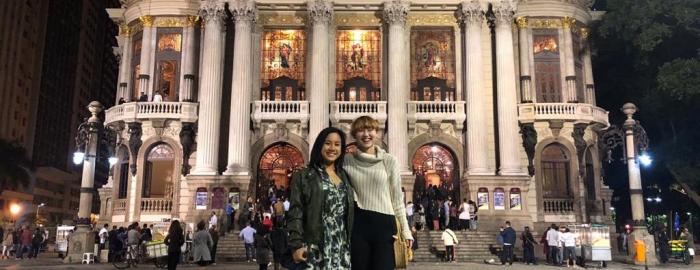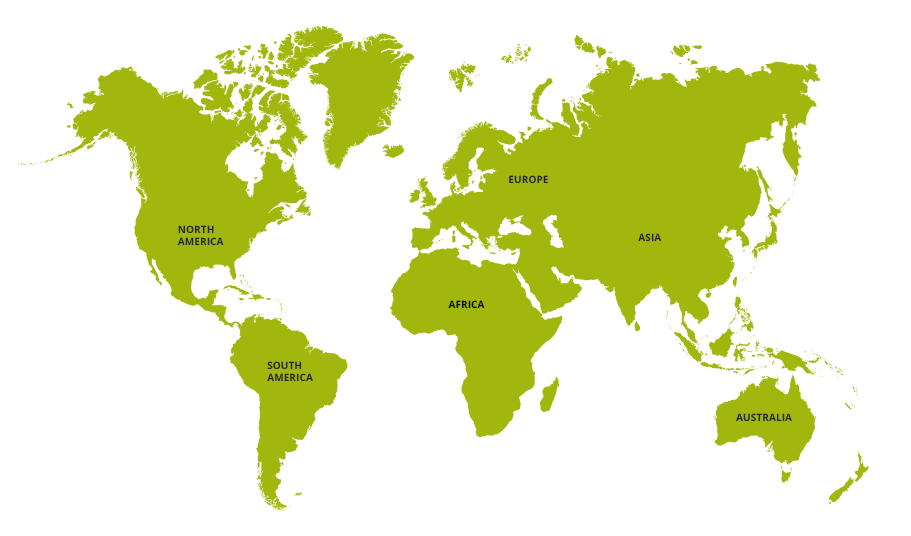Duke in Brazil
A 4-WEEK SUMMER PORTUGUESE LANGUAGE & BRAZILIAN CULTURE PROGRAM
Program Alert
Duke in Brazil Info Sessions
Wednesday, January 24, 4:30pm to 5:30pm in Languages 109
Friday, February 2nd from 5pm to 6pm in Languages 114A
STUDY BRAZIL’S UNIQUE SOCIAL AND ENVIRONMENTAL ISSUES
Apply NowOffered only on the Duke in Brazil program, the signature four-week immersion course is designed to provide intensive Portuguese language instruction while exposing you to the reality of social and environmental issues in Rio de Janeiro.
You will interact with non-governmental organizations (NGOs) that engage on issues of civics, citizen’s rights, culture, and sustainable development. By living with host families, meeting local students, and participating in several excursions of cultural significance, you’ll gain a deeper understanding of cultural and social activism in Brazil.
PROGRAM FAST FACTS
Location: Rio de Janeiro, Brazil and Paraty, Brazil
Term: Summer II
Dates: June 30, 2024 - July 28, 2024
Application Deadline: February 1
Academic Theme(s): Portuguese Language, Brazilian Culture
Credit Type: Duke Credit
Eligibility: Open to all majors and applicants from accredited colleges and universities. Applicants should have completed one of the following levels of Portuguese by the start of the program: Portuguese 102 (Elementary Portuguese II), Portuguese 112 (Accelerated Portuguese), or Portuguese 204 (Advanced Intermediate Portuguese)
Duke Affiliation: Co-sponsored by Duke’s Department of Romance Studies
Housing: Homestay Families
Primary Contact: Magda Silva
ACADEMICS
You will enroll in one Portuguese language course worth one Duke course credit. This four-week immersion course is offered only on the Duke in Brazil program.
- COURSE
- COURSE SCHEDULE
COURSE
PORTUGUE 203A
Intensive Brazilian Portuguese
FL, CCI, CZ 1.0 Credit
Instructor: Magda Silva
Prerequisite: One of the following courses: PORTUGUESE 102, PORTUGUESE 112, or PORTUGUESE 204
This course covers the intermediate language curriculum, developing aural comprehension, speaking, reading and writing skills. It provides grammar practice and development of effective strategies for oral communication done in conjunction with intensive cultural program activities and excursions.
The course content offers strong and intensive civics, social, cultural, and environmental components. All afternoon activities and excursions will be centered around visits to NGOs that engage in all of these issues.
PORTUGUE 301SA
Advanced Colloquial Portuguese
CCI, FL, W 1.0 Credit
Instructor: Magda Silva
Prerequisite: PORTUGUE 204 or instructor approval
Study of colloquial Portuguese as a catalyst of popular culture; sayings, expressions, and proverbs. Emphasis on oral communication. We will do an examination of the factors that have had a cultural impact in the Portuguese language involving religion, gender, politics, or ethnicity. We will study such things as everyday talk; illiteracy and identity; stories, legends; comedy, poetry, music, advertisements, the influence of English in the Portuguese language; the machismo in the everyday vocabulary. How these linguistic/cultural phenomena both represent and complicate our notions of cultural norms in the learning of the Portuguese language.
COURSE SCHEDULE
Classes meet M-F in the morning at Federal University of Rio de Janeiro, with afternoon activities and excursions.
Weeks 1 and 2: During the first two weeks, we will focus on social issues and visit NGOs that engage on civics, citizen’s rights, and cultural aspects; and we will investigate how and why these are missing in the overall Brazilian public educational system.
Weeks 3 and 4: During the second two weeks, we will focus on environmental issues by visiting NGOs that contribute to sustainable development and social and civics inclusion.
EXCURSIONS
In addition to visits to local NGOs, you will have an opportunity to explore the surrounding area and learn about local culture through excursions to museums, a samba house in Lapa, historical downtown Rio, an Umbanda temple, Escadaria Selarón, Christ the Redeemer, Sugar Loaf, Ipanema beach, local markets, and the Maracanã soccer stadium.
HOUSING & MEALS
You will stay with carefully selected local homestay families in Rio, who will help enrich your linguistic and cultural experience. The host families will provide two meals a day (breakfast and dinner) and basic home necessities like a bedroom, internet, and kitchen access if needed. You will be responsible for your own lunch.
COSTS
These costs are estimated based on previous years’ programs and the current exchange rate. All costs are subject to change.
Summer 2024
| Duke Students | Non-Duke Students | |
|---|---|---|
| Tuition | $2,840 | $2,840 |
| Program Fee | $6,250 | $6,250 |
| Transcript Fee | N/A | $120 |
| Other Costs | Other Costs | Other Costs |
| TOTAL (Estimated) | $11,400 | $11,520 |
Explanation of Costs
The program fee for this program includes:
- Accommodations
- Breakfast and dinner every day
- Four or five group meals through the course of the program
- International SOS Coverage
- Program-sponsored activities and excursions
- Orientation program
What is not included?
Use the following list to assist with budgeting for expenses outside the program fee. This list contains common examples but should not be considered exhaustive.
- Airfare
- Local transportation
- Lunch daily
- On-site accident and health insurance policy
- Out-of-pocket medical expenses
- Immunizations
- Visa and/or residency permit
- Passport
- Textbooks and class materials
- Internet usage
- Mobile phone
- Laundry
- Independent travel and entertainment
- Items of a personal nature
- Incidentals
U.S. citizens are required to obtain a tourist visa for this program. Visa cost estimates shown in 'Other Costs' link above are based on U.S. citizenship status. If you are not a U.S. citizen, please be sure to research the cost of obtaining a visa for Brazil.
If you receive financial aid, and need assistance with travel costs to a consulate or embassy, please contact your financial aid counselor.
Personal expenses can fluctuate greatly depending upon habits and preferences of the individual. It’s also wise to budget for unexpected expenses such as medical emergencies. You can use a cost-of-living comparison tool to get an idea of what daily life costs in the program host location.
Step 1: Upon acceptance to the program, you must submit the Summer Participation Agreement found in your MyExperientialEd application to confirm your enrollment. A parent/guardian’s co-signature is required. This form takes the place of a deposit.
NOTE: If you withdraw after March 15, you will be charged a cancellation fee for voluntary withdrawal. Fees range from $2,000-$3,000.
Step 2: Summer invoices will be sent via email to your Duke email address and home email address. Remit payment to the Bursar per due date and address indicated on your online statement. Consult the Duke Bursar's office billing schedule for payment due dates.
Financial Aid
Duke students receiving institutional need-based grant aid are eligible for aid for this program; work-study funds are converted to grants. Students are individually responsible for making the necessary arrangements with the Karsh Office of Undergraduate Financial Support and the Duke Bursar’s Office.
Non-Duke students are not eligible to receive financial aid at Duke and should contact their home institutions for financial aid information.
Scholarships
This program offers the following scholarship opportunities:
DATES
Attendance is required at all classes, excursions, and group events. Given the intense nature of this program, late arrival and/or early departure is not permitted.
- Arrival: June 30, 2024
- Departure: July 28, 2024
Schedule
Classes will be held in the mornings five days a week (M-F). Field trips and cultural events will take place during the afternoons and/or the weekends. A detailed itinerary will be provided prior to departure.
Flights
You will make your own travel arrangements to and from the program site. You are expected to arrive on the arrival date cited above, which usually means departing the U.S. one day prior. Once you have a flight itinerary, log in to MyExperiential to update your travel registry.
Housing Before/After
You will need to make your own housing arrangements if you will be arriving before the program start date or leaving later than the program end date.
VISA & PASSPORT
VISA
Starting in January, citizens of the United States, Australia and Canada will need a visit visa (VIVIS) to travel to Brazil. Visa applications will be available via an online E-visa system. Please check with the program manager if you have questions about the visa process. Non-U.S. citizens should pay special attention to the visa requirements for their specific citizenship by contacting the Brazilian embassy or consulate.
PASSPORT
All participants must have a valid passport. Make sure your passport has at least six months of validity beyond the program end date to avoid unintended disruptions. For instructions on obtaining or renewing your U.S. passport, visit passports.state.gov.
INTERNATIONAL STUDENT IDENTITY CARD
An International Student Identity Card (ISIC) is required for this program. ISIC is the only internationally recognized form of student ID, endorsed by UNESCO. If purchased in the U.S., the card also carries with it a supplemental insurance policy, which can prove to be very helpful in the event of serious injury. You may purchase this card through www.myisic.com. Processing of the card takes between 4-15 days. Please order your card well in advance of your departure.
PROGRAM FACULTY & STAFF
The Duke in Brazil program director can assist with questions related to program academics, admissions, on-site needs, etc. For all other inquiries, please contact the GEO representative listed.


ADMISSIONS
Deadline: February 1
This program has rolling admission. Applications will be considered on a first-come, first-served basis until the program fills; after that, qualified students are added to a waitlist and notified of openings. Applications must be received by the deadline to be considered. Application opens November 1.
Priority:
Eligibility: Applicants should have completed one of the following levels of Portuguese by the start of the program: Portuguese 102 (Elementary Portuguese II), Portuguese 112 (Accelerated Portuguese), or Portuguese 204 (Advanced Intermediate Portuguese).
Minimum GPA: There is no minimum GPA.
Non-Duke students: Non-Duke students are welcome to apply to this program. You must be a degree-seeking student in good standing at an accredited college or university. Consult your university’s registrar and/or study away advisor for assistance with transfer credit. Students who are not matriculated at a college or university are not eligible to participate in Duke’s study away programs.
Late applicants: After the published deadline, qualified applicants will be considered on a space-available basis.
GEO policy for graduating seniors who wish to apply for a Duke summer study abroad/away program:
Students must be active, matriculated students in order to participate in any Duke-in summer programs, including Duke’s domestic summer programs. All program courses must be taken for graded credit. If seniors plan to graduate in May of the year they plan to study abroad in the summer, they will not be eligible to participate on any of our summer programs unless they receive approval from their academic dean at Duke to delay their graduation until after the summer program has ended.
Non-Duke students planning to graduate in May in the year they plan to study abroad in the summer must provide approval to delay their graduation until after the summer program has ended from the appropriate official at their home institution. Such approval must be furnished in writing to GEO before the student will be allowed to participate in the summer program. This approval may be sent via email to the appropriate program assistant at GEO.
Duke students who defer their graduation to participate in study abroad should consult with their financial aid advisor in the Duke Office of Undergraduate Financial Aid to determine whether they are eligible for a summer aid package and/or a GEO summer scholarship.
APPLY
Start your application early to ensure that it is complete by the deadline! Incomplete applications will not be forwarded to the program directors for consideration.
Submit the following items using MyExperientialEd:
- Online application
- Transcript(s) from all colleges and universities attended. First-year students should wait for fall semester grades to be posted before submitting their transcript.
- Personal statement, no longer than one page, explaining why you would like to participate
- GEO Language Questionnaire
- Language recommendation













